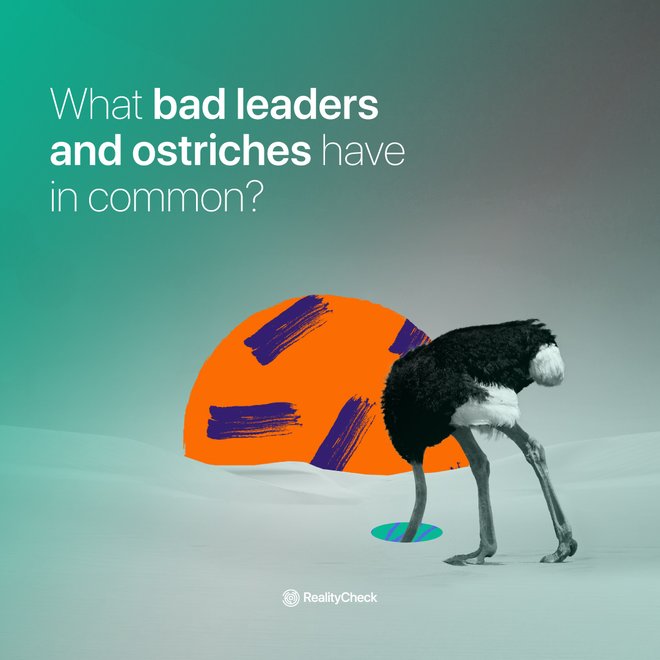"The ostrich effect" is a cognitive bias that causes people to avoid information they perceive as potentially unpleasant. This can happen with feedback, and not all leaders are open to hearing how others really see them – but all leaders need this information to succeed.
You have probably heard of biases – cognitive dissonances resulting in a view of the world as different from what it really is. The awareness of biases has been raised by a growing interest in results from cognitive science. More than 180 different biases has been identified – that’s a lot. Let that number sink in. One could say that as you look up from your screen, the reality you see is potentially being thwarted in more than 180 different ways.
These biases tend to circumvent our consciousness, they go unnoticed. Your only chance to identify them is to question their result, a result that shows up as your view of reality. To have to constantly question your own perception regarding more than 180 different "filters" would require an enormous effort, beyond of what anyone is capable. (Most struggle to question their opinion regarding anything they already believe.)

Faced with such numbers, and demands of effort, it might feel natural to bury one's head in the sand, like an ostrich – to withdraw from reality for a while.
(It so happens that ostriches don’t actually express this type of behaviour – as you shall see further below in this text, it would be devastating for them. They do however stick their head down to check on their eggs in their nests.)
During every living moment our bodies are bombarded with information, most of it unrelevant for our survival. One of the brain's main functions is to help us identify what is truly relevant and requires focus. As you read this text, your brain doesn’t have to focus on the information from your fingers scrolling – but since we mentioned it, your focus probably went there only to realize that there’s nothing important there. Should you find something of interest there you would probably not be continuing to read this!
Biases are always in play and as such they factor into a 360-feedback. Doesn’t that question the value of a 360-report? Since there are so many ways in which people have distorted views of each other, how accurate could a report be? Well, we’d say that it’s of tremendous value to let as many opinions as possible surface. Not knowing others' opinions, no matter how distorted, won’t cancel the effect of them. You would still – always, in fact – be judged by others through their own lenses. Which is why we call our 360-feedback a "RealityCheck"; it allows you to get in touch with more aspects of reality than you usual. Receiving this information is pivotal for everyone, and not knowing how others perceive you leaves you blind to others’ perspectives.
A blind animal will not survive long, which is why it’s outrageous to believe that an ostrich would hide away from threats by burying their heads in the sand – it makes for poor defence. Their hunter will still see them as prey even if the ostrich fails to see their hunter. Similarly, a blind leader will not be able to influence their colleagues as successfully as someone who is made aware of how they are perceived. Companies shouldn’t leave their leaders blind. 9 out of 10 companies among the Fortune 500 use 360. From our experience in Sweden, we’d say that the number here is far far less. We have worked with some of Sweden’s biggest companies and have yet to see 360-feedback being deployed yearly.
Getting a clear understanding of what others see when they see you has become increasingly important. We say this based on the fact that we don’t see each other as often anymore. Work is remote, hybrid and asynchronous in a way it wasn’t before. This puts tremendous pressure on all leaders to stay updated on relevant factors. Hiding away and giving up is the short term easy solution. In the end, the ones making an effort to listen to others’ feedback are the ones most likely to survive and grow.
Knowing this about the leaders we support has led us to strive for the most empathic 360-feedback experience on the market. If a report is overwhelming, leaders won’t digest it and the efforts behind it are lost. To succeed with this, we will not bury our heads in the sand – instead we try to understand as much as possible about how leaders perceive their reports and the processes encasing the 360-feedback experience.
All rights reserved. Copyright © RealityCheck 2020 –